Related Research Articles

James Branch Cabell was an American author of fantasy fiction and belles-lettres. Cabell was well-regarded by his contemporaries, including H. L. Mencken, Edmund Wilson, and Sinclair Lewis. His works were considered escapist and fit well in the culture of the 1920s, when they were most popular. For Cabell, veracity was "the one unpardonable sin, not merely against art, but against human welfare."

Adeline Virginia Woolf was an English writer. She is considered one of the most important modernist 20th-century authors. She pioneered the use of stream of consciousness as a narrative device.
In literary criticism, stream of consciousness is a narrative mode or method that attempts "to depict the multitudinous thoughts and feelings which pass through the mind" of a narrator.

Sir Peter Courtney Quennell was an English biographer, literary historian, editor, essayist, poet, and critic. He wrote extensively on social history. In his Times obituary he was described as "the last genuine example of the English man of letters". Anthony Powell called him "The Last of the Mandarins".

John Cowper Powys was an English novelist, philosopher, lecturer, critic and poet born in Shirley, Derbyshire, where his father was vicar of the parish church in 1871–1879. Powys appeared with a volume of verse in 1896 and a first novel in 1915, but gained success only with his novel Wolf Solent in 1929. He has been seen as a successor to Thomas Hardy, and Wolf Solent, A Glastonbury Romance (1932), Weymouth Sands (1934), and Maiden Castle (1936) have been called his Wessex novels. As with Hardy, landscape is important to his works. So is elemental philosophy in his characters' lives. In 1934 he published an autobiography. His itinerant lectures were a success in England and in 1905–1930 in the United States, where he wrote many of his novels and had several first published. He moved to Dorset, England, in 1934 with a US partner, Phyllis Playter. In 1935 they moved to Corwen, Merionethshire, Wales, where he set two novels, and in 1955 to Blaenau Ffestiniog, where he died in 1963.

Mrs Dalloway is a novel by Virginia Woolf published on 14 May 1925. It details a day in the life of Clarissa Dalloway, a fictional upper-class woman in post-First World War England. It is one of Woolf's best-known novels.
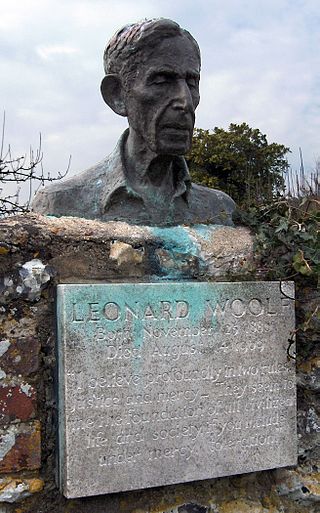
Leonard Sidney Woolf was a British political theorist, author, publisher, and civil servant. He was married to author Virginia Woolf. As a member of the Labour Party and the Fabian Society, Woolf was an avid publisher of his own work and his wife's novels. A writer himself, Woolf created nineteen individual works and wrote six autobiographies. Leonard and Virginia did not have any children.
Matthew Joseph Bruccoli was an American professor of English at the University of South Carolina. He was the preeminent expert on F. Scott Fitzgerald. He also wrote about other writers, notably Ernest Hemingway, Thomas Wolfe and John O'Hara, and was editor of the Dictionary of Literary Biography.
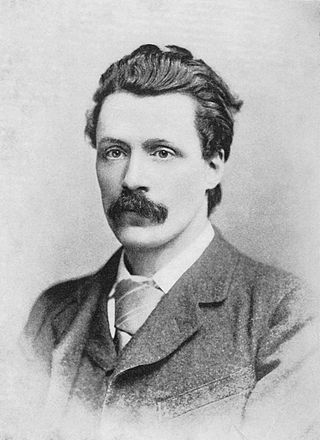
George Robert Gissing was an English novelist, who published 23 novels between 1880 and 1903. In the 1890s he was considered one of the three greatest novelists in England, and by the 1940s he had been recognised as a literary genius. Gissing's best-known works have reappeared in modern editions. They include The Nether World (1889), New Grub Street (1891) and The Odd Women (1893). He retains a small but devoted group of followers.
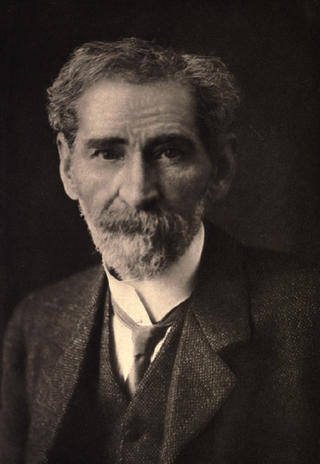
William Henry Hudson, known in Argentina as Guillermo Enrique Hudson, was an Anglo-Argentine author, naturalist and ornithologist.

The Hogarth Press is a book publishing imprint of Penguin Random House that was founded as an independent company in 1917 by British authors Leonard Woolf and Virginia Woolf. It was named after their house in Richmond, in which they began hand-printing books as a hobby during the interwar period.
Dorothy Miller Richardson was a British author and journalist. Author of Pilgrimage, a sequence of 13 semi-autobiographical novels published between 1915 and 1967—though Richardson saw them as chapters of one work—she was one of the earliest modernist novelists to use stream of consciousness as a narrative technique. Richardson also emphasises in Pilgrimage the importance and distinct nature of female experiences. The title Pilgrimage alludes not only to "the journey of the artist ... to self-realisation but, more practically, to the discovery of a unique creative form and expression".
Maurice Baring was an English man of letters, known as a dramatist, poet, novelist, translator and essayist, and also as a travel writer and war correspondent, with particular knowledge of Russia. During World War I, Baring served in the Intelligence Corps and Royal Air Force.
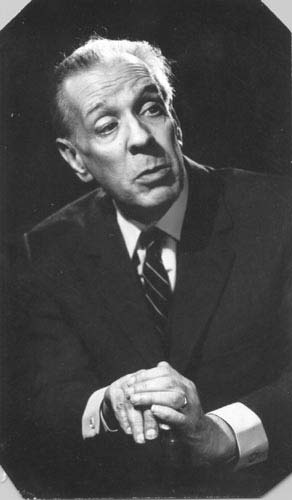
This is a bibliography of works by Argentine short-story writer, essayist, poet, and translator Jorge Luis Borges (1899–1986).
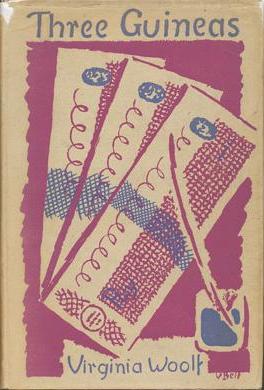
Three Guineas is a book-length essay by Virginia Woolf, published in June 1938.

Percy Lubbock, CBE was an English man of letters, known as an essayist, critic and biographer. His controversial book The Craft of Fiction gained influence in the 1920s.

Monk's House is a 16th-century weatherboarded cottage in the village of Rodmell, three miles (4.8 km) south of Lewes, East Sussex, England. The writer Virginia Woolf and her husband, the political activist, journalist and editor Leonard Woolf, bought the house by auction at the White Hart Hotel, Lewes, on 1 July 1919 for 700 pounds, and received there many visitors connected to the Bloomsbury Group, including T. S. Eliot, E. M. Forster, Roger Fry and Lytton Strachey. The purchase is described in detail in her Diary, vol. 1, pp. 286–8.

The bibliography of George Orwell includes journalism, essays, novels, and non-fiction books written by the British writer Eric Blair (1903–1950), either under his own name or, more usually, under his pen name George Orwell. Orwell was a prolific writer on topics related to contemporary English society and literary criticism, who has been declared "perhaps the 20th century's best chronicler of English culture." His non-fiction cultural and political criticism constitutes the majority of his work, but Orwell also wrote in several genres of fictional literature.
The Gissing family of Great Britain included several noted writers, Olympic competitors, and teachers.
Tomris Uyar was a Turkish writer and translator. She was born in Istanbul, the daughter of two lawyers and granddaughter of Republican People's Party politician Süleyman Sırrı Gedik. She was educated at the British Girls' Secondary School and at Arnavutköy American Girls' College, now called Robert College (1961). She graduated from the Journalism Institute affiliated to the Faculty of Economics of Istanbul University (1963).